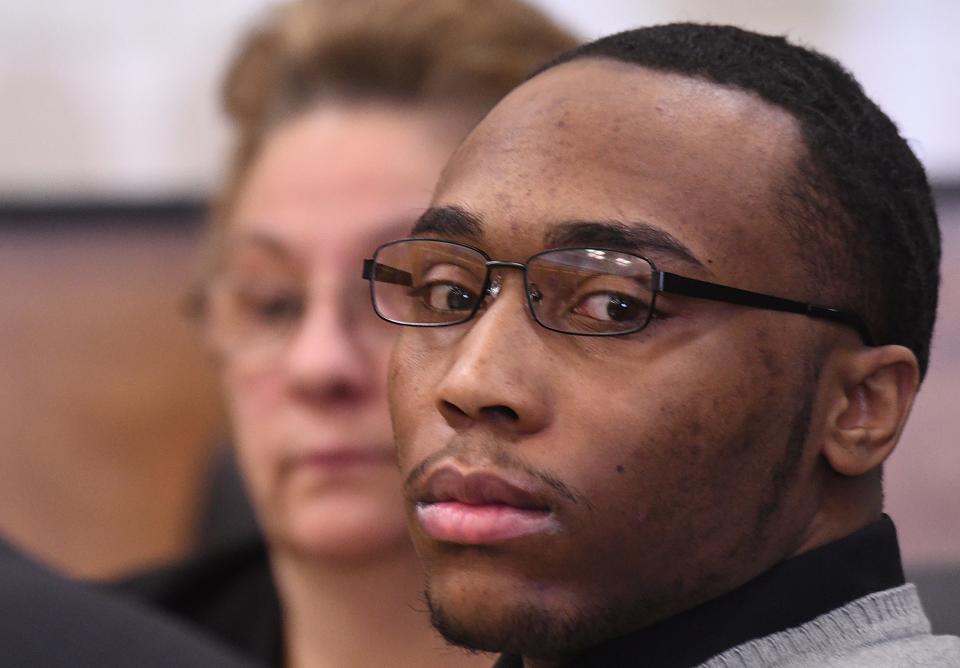Convicted murderer's case denied by court of appeals
In the ongoing appeals of Khairi Bond's murder conviction, an appellate court has ruled against him.
Ohio's Fifth District Court of Appeals rejected the three claims of error made by Bond through Columbus attorney Charles Koenig.
Bond's case has been considered a number of times, including by the Ohio Supreme Court.

Now 27, Bond was convicted of murder in 2019 for the shooting death of Nolan Lovett, which happened May 3, 2018. He was sentenced to 18 years to life in prison.
The shooting happened in front of 737 Bowman St. When Mansfield police arrived, they found Lovett, 32, lying outside with a gunshot wound to the chest. He was pronounced dead at OhioHealth Mansfield Hospital.
Late last year, the Ohio Supreme Court overruled the appellate court, which had determined that Brent Robinson, Richland County common pleas judge, deprived Bond of his constitutional right to a public trial when he partially closed proceedings to the public.
Robinson had limited the gallery to immediate family members after a near-brawl broke out in the lobby outside the courtroom.
Because the Fifth District Court of Appeals ordered a new trial on that issue, the three-judge panel did not review Bond's three other assignments of error, considering them moot points.
Ohio Supreme Court orders appellate court to review trio of issues
While overruling a new trial, the Ohio Supreme Court did order the appellate court to review those other three issues.
The other three assignments of error were the following:
"The verdict of the jury finding the defendant guilty of felony murder was contrary to the manifest weight of the evidence.
"The trial court improperly allowed irrelevant evidence and permitted the state to engage in prosecutorial misconduct by admitting a 'gangsta rap' song, in violation of the due process clause of the 5th and 14th amendments.
"Appellant was deprived of his constitutional rights to due process in violation of the 6th and 14th amendments of the U.S. Constitution as a consequence of ineffective assistance of counsel."
Around 1 p.m. on the day of the shooting, Bond showed up to Lovett's home at 737 Bowman St. The man who answered the door asked him why he was there, and Bond responded that Lovett had just left the house.
The resident knew the pair had history, so he tried to contact Lovett. As Bond headed back to his car, Lovett and another man pulled up.
As Bond and Lovett confronted each other, the man with Lovett said Bond pulled out his gun and started shooting. Bond was arrested four days later near Columbus.
Following deliberations, the jury acquitted Bond of purposeful murder with a gun specification but found him guilty of felony murder with a gun specification.
In his appeal, Bond argued the testimony of eyewitnesses was "riddled with inconsistencies and contradictions" and not credible.
The Fifth District Court of Appeals disagreed.
"Based upon the entire record in this matter, we find Bond's conviction is not against the sufficiency or the manifest weight of the evidence," judges wrote. "To the contrary, the jury appears to have fairly and impartially decided the matters before them. The jury heard the witnesses, evaluated the evidence and was convinced of Bond's guilt.
"... we cannot reach the conclusion that the trier of facts lost its way and created a manifest miscarriage of justice. We do not find the jury erred when it found Bond guilty. Taken as a whole, the testimony and record contain ample evidence of Bond's responsibility for the alleged crime."
Bond objects to prosecutors playing 'gangsta' rap song for jury
In the next assignment of error, Bond argues it was improper for the state to introduce the full lyrics and music video of a "gangsta" rap song as evidence of Bond's predisposition to shoot Lovett.
A police detective testified that Bond admitted tweeting the following lyric, "Hit him in his head, knock off dreads, now he can't make a sound."
Bond argued the lyrics were irrelevant and "substantially more prejudicial than probative."
The state argued the lyrics were relevant to show Lovett's state of mind as he was going to Lovett's house. The state said Lovett wore his hair in dreadlocks.
The appellate court said, "Bond was not indicted for premeditated murder. The lyrics cannot be construed as an admission because the rap lyrics were not written by Bond. Only one sentence or lyric was found on Bond's phone."
Further, the court determined the lyrics to be "harmless beyond a reasonable doubt."
"We find there is no reasonable possibility that this testimony contributed to Bond's conviction, and, after removing the evidence related to the lyrics, the remaining evidence is sufficient to prove beyond a reasonable doubt Bond's guilt for murder," the judges wrote.
In the final assignment of error, Bond contended that his defense attorney was ineffective for failing to ask the court to instruct the jury on the lesser offense of aggravated assault, which involves a person being "under the influence of sudden passion or in a sudden fit of rage, either of which is brought on by serious provocation occasioned by the victim that is reasonably sufficient to incite the person into using deadly force."
The appellate court said Bond cited no evidence to indicate any provocation by Lovett was reasonably sufficient to incite him into using deadly force and affirmed the judgment of Richland County Common Pleas Court.
Bond is an inmate at Richland Correctional Institution. His first parole hearing is scheduled for March 2036.
mcaudill@gannett.com
419-521-7219
Twitter: @MarkCau32059251
This article originally appeared on Mansfield News Journal: Mansfield man convicted in 2018 murder case denied by court of appeals

